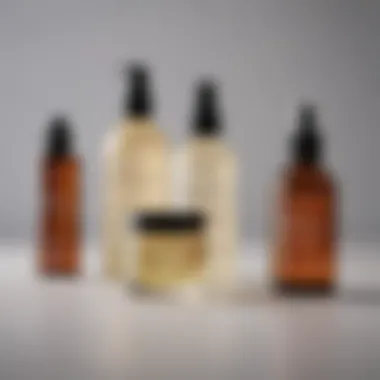Exploring the Best Scalp Treatments: A Comprehensive Guide


Intro
Scalp health often remains an overlooked aspect of beauty and personal care. Many individuals are unaware of the important role a healthy scalp plays in overall hair growth and wellness. It is not merely the hair that requires attention; the scalp itself is crucial for fostering vibrant and beautiful hair. Issues such as dryness, irritation, and flakiness can lead to more serious complications if neglected. This guide aims to explore various scalp treatments, examining their ingredients, effectiveness, and intended results.
Whether an individual struggles with dandruff, sensitivity, or lack of moisture, there are treatments available to address specific concerns. By understanding the types of scalp issues and the treatments designed for them, individuals can make informed choices tailored to their unique needs.
This article will give a comprehensive overview of trending topics in scalp care, detailed step-by-step guides, and in-depth product reviews. It will also analyze common problems and their solutions in a methodical manner. Thus, readers will be equipped with the insights necessary to enhance their scalp health effectively.
Understanding Scalp Health
Understanding scalp health is essential for maintaining not only the scalp itself but also the overall health of hair. The scalp is often overlooked in most beauty regimens. However, its condition can directly affect hair growth, hair loss, and the general appearance of hair. Inadequate scalp care can lead to issues such as dryness, irritation, and conditions that exacerbate hair problems.
Taking care of your scalp has several benefits. A healthy scalp promotes better hair growth and can prevent issues like flakiness and inflammation. Additionally, being aware of common scalp conditions allows for early intervention, which can significantly improve one’s hair health.
Careful attention to scalp health includes regular cleansing, moisturizing, and potentially treating specific conditions that can arise. Factors such as diet, environment, and overall stress levels play a role in scalp health as well. Thus, understanding and caring for the scalp should be integral to one's hair care routine.
The Importance of Scalp Care
Scalp care is vital because it sets the foundation for healthy hair. A well-maintained scalp is free of excess oil, buildup, and irritants that can damage hair follicles. Neglecting this part of personal care may lead to conditions like dandruff or seborrheic dermatitis, which can result in hair thinning or loss.
Regular scalp care can lead to an improved scalp ecosystem, creating an environment where hair can thrive. Treatments specifically designed for scalp issues can be incorporated effectively into one’s routine. Educational awareness around these products empowers individuals to select suitable treatments tailored to their needs.
Common Scalp Conditions
Understanding common scalp conditions is necessary for effective treatment and prevention. Each of these conditions has unique traits that can affect the choice of scalp treatments.
Dandruff
Dandruff is a mild yet common scalp condition characterized by flakiness and irritation. It often results from dry skin or an increase in yeast on the scalp. Recognizing dandruff's presence is important because it can sometimes signal a more serious issue, like seborrheic dermatitis.
Key characteristic: Dandruff often produces white flakes that can be seen on the hair and shoulders. The scalp may also feel itchy. This condition is advantageous in this article as it represents a relatable issue many face.
Unique feature: Dandruff can usually be managed with over-the-counter shampoos containing active ingredients like pyrithione zinc. Its manageability makes it a topic of interest for those looking to maintain scalp health.
Psoriasis
Psoriasis on the scalp can be identified by red, scaly patches and significant flakiness. It is an autoimmune condition that requires specialized treatment. The severity can vary greatly and sometimes leads to discomfort and itching.
Key characteristic: This condition can extend beyond the scalp, impacting areas around ears and back of the neck. Discussing psoriasis provides insights into more severe scalp issues.
Unique feature: Treatments for psoriasis often include prescription topical medications or phototherapy. This complexity warrants attention for individuals affected by it.
Seborrheic Dermatitis
Seborrheic dermatitis appears as red, greasy, and scaly patches on the scalp. It is often mistaken for dandruff but is typically more severe and requires medical advice for appropriate management.
Key characteristic: It is marked by yellowish oily flakes rather than the dry flakes associated with simple dandruff. This distinction is critical for effective treatment.
Unique feature: It can be chronic, requiring ongoing treatment. Discussing seborrheic dermatitis informs readers about the necessity of seeking professional help when self-care does not yield results.
Scalp Acne
Scalp acne, often an overlooked condition, appears as small pimples on the scalp. Hormonal changes, product build-up, or reactive ingredients can cause it. Being aware of scalp acne is crucial for those who notice sudden outbreaks.
Key characteristic: Scalp acne can create pain and itching, which can influence an individual’s overall comfort.
Unique feature: Unlike facial acne, scalp acne can be challenging to treat due to hair obstructing access. Thus, it requires specific shampoos and treatments designed for the scalp to combat it effectively.


Recognizing Scalp Sensitivity
Recognizing scalp sensitivity is important for maintaining health and comfort. A sensitive scalp may react adversely to various hair products, ranging from shampoos to styling products. Symptoms like redness, itching, or burning are signs of sensitivity that need to be addressed.
This awareness encourages individuals to select gentler products and incorporate a patch-testing routine for all new treatments. Continued monitoring ensures that the right care is provided, preventing unnecessary discomfort and maintaining scalp integrity.
Evaluating Scalp Treatments
Understanding the variety of scalp treatments available is crucial for tailored scalp care. Evaluating scalp treatments involves examining the differences in products, their intended benefits, and the effectiveness based on individual needs. Each type of treatment varies in formulation and purpose, providing unique features that can help resolve specific issues such as dryness, flakiness, or scalp irritation. For an informed decision, one must assess several factors, including the product's ingredients, concentration, and usage goals. Additionally, personal preferences and specific scalp conditions should influence the choice of treatment, ensuring optimal care for this often-overlooked part of personal grooming.
Types of Scalp Treatments
Shampoos and Conditioners
Shampoos and conditioners serve as fundamental products in caring for the scalp. They are designed to cleanse and moisturize hair and scalp without stripping essential oils. A key characteristic of shampoos is their formulation, which can include medicated ingredients aimed at treating various conditions. They offer a convenient way to address scalp health during regular hair washing. The advantage of using specific shampoos and conditioners is that they provide a dual function of cleansing and treating, making them popular for those seeking simple, everyday solutions. However, some formulations may produce buildup or irritation if used excessively or if they contain harsh chemicals.
Scalp Masks
Scalp masks are concentrated treatments that offer intense hydration and nourishment to the scalp. They can be rich in natural oils, vitamins, and other beneficial substances. The key characteristic of scalp masks is their ability to deeply penetrate the scalp, delivering active ingredients that can help soothe irritation and repair damage. This makes them a beneficial option for those experiencing chronic dryness or flakiness. However, users should be aware of potential residues that may require thorough rinsing and could render hair feel greasy if not applied properly.
Exfoliating Treatments
Exfoliating treatments are important for maintaining scalp health by removing dead skin and excess sebum. The primary characteristic is their ability to unclog pores and promote a balanced scalp. These treatments often contain granular substances or chemical exfoliants that facilitate the sloughing off of dead skin. They are popular among individuals with oily or dandruff-prone scalps. However, caution must be exercised, as over-exfoliating can lead to irritation or sensitivity in the scalp, counteracting their intended benefits.
Oils and Serums
Oils and serums target various scalp concerns by providing hydration and nourishment. A major characteristic is their lightweight, easily absorbable formulation. These products can contain a variety of active ingredients aimed at soothing irritations or enhancing hair growth. Oils like tea tree or jojoba can help alleviate dryness while promoting scalp health. They are popular due to their versatility and ease of use, allowing for targeted application. However, some users may find them too heavy, resulting in limp hair if not balanced properly in their hair care routine.
Key Ingredients to Look For
Salicylic Acid
Salicylic acid is a well-known ingredient in scalp treatments primarily for its exfoliating properties. It helps to dissolve dead skin and excess oil, making it a potent choice for those dealing with dandruff or oily scalps. The main advantage of salicylic acid is its ability to promote a clearer, healthier scalp. However, it may cause dryness in some individuals, necessitating caution in usage.
Tea Tree Oil
Tea tree oil is famed for its antibacterial and antifungal qualities. It can soothe irritated skin and reduce inflammation, making it an ideal choice for addressing scalp sensitivity. The key characteristic of tea tree oil is its natural origin, setting it apart from synthetic agents. As a beneficial ingredient, it can help mitigate flakiness while nourishing the scalp. On the downside, overly concentrated formulations may irritate sensitive scalps if not diluted properly.
Coal Tar
Coal tar is primarily used for its ability to alleviate symptoms of psoriasis and seborrheic dermatitis. Its key characteristic is its properties that slow skin cell turnover, providing long-term relief from plaque buildup. It's a beneficial component in specialized shampoos, often recommended for chronic scalp conditions. However, coal tar can have a strong scent, and its staining potential must be considered when using on light-colored hair.
Ketoconazole
Ketoconazole is an antifungal agent commonly found in medicated shampoos. It effectively treats fungal-related issues, such as dandruff and seborrheic dermatitis. The key feature is its ability to combat the underlying causes of these conditions, making it a beneficial choice for targeted treatment. However, it may cause scalp irritation in some cases and is generally recommended for sporadic use rather than everyday application.
Evaluating Product Claims
Understanding Labels
Understanding product labels is essential when selecting a scalp treatment. Ingredients lists tell consumers about the formulations and their effectiveness. The main characteristic of product labels is transparency, allowing users to make informed choices. This aspect is particularly beneficial for ensuring that a treatment aligns with specific scalp concerns. However, some labels may use technical jargon that can confuse consumers and obscure the clarity needed for informed decision-making.
Consumer Reviews and Feedback
Consumer reviews and feedback provide real-world insights into how effective a product is. This characteristic makes them invaluable when assessing various treatments. They can highlight potential pros and cons based on actual experiences, guiding future buyers. However, it is important to consider that individual results can vary; what works for one person may not work for another, creating a nuanced understanding of product efficacy.
Clinical Studies and Efficacy
Clinical studies provide evidence for the effectiveness of specific scalp treatments. The main characteristic of these studies is their research-backed findings, which contribute to the credibility of products. This makes them a beneficial aspect of evaluations for consumers seeking proven solutions. However, the accessibility of such studies can be limited, and not all products have extensive clinical backing, leading to variability in available information.


Overall, thorough evaluation of scalp treatments ensures suitable choices that match unique scalp needs.
DIY Scalp Treatments
DIY scalp treatments have gained popularity due to their accessibility and cost-effectiveness. Many individuals are seeking natural solutions to address scalp issues like dryness, itchiness, and irritation. These homemade treatments often use ingredients that are readily available, making them an attractive option for many. The benefits of DIY treatments include full control over what goes onto the scalp, the ability to customize remedies to suit individual needs, and an avoidance of certain chemical additives found in commercial products. However, this approach requires a level of caution as not all remedies may be suitable for every scalp type.
Natural Remedies for Scalp Care
Aloe Vera
Aloe Vera is known for its soothing properties, making it a popular option for scalp treatment. Its key characteristic lies in its ability to hydrate and calm irritated skin. The gel extracted from the plant provides essential moisture, which can alleviate dryness and flakiness. Moreover, Aloe Vera contains enzymes that help to remove dead skin cells, contributing to healthier scalp conditions. One unique feature of Aloe Vera is its anti-inflammatory properties, which can help reduce redness and irritation. However, while many find it beneficial, some may experience sensitivity or an allergic reaction, so it is advisable to perform a patch test before widespread use.
Apple Cider Vinegar
Apple cider vinegar has long been used as a natural remedy for various health issues, including scalp care. Its critical characteristic is its ability to balance the pH of the scalp, helping to eliminate yeast overgrowth and reduce dandruff. The acidity of apple cider vinegar can also help to clarify the scalp and remove build-up from hair products. A unique feature is its antimicrobial properties, which may help prevent scalp infections. Despite these advantages, the strong scent may deter some individuals and should be diluted with water before application to avoid irritation.
Coconut Oil
Coconut oil is revered for its moisturizing capacity and is often recommended for scalp care. Its main characteristic is its ability to penetrate the hair shaft more deeply than other oils, providing essential nourishment. This oil works well to combat dryness and may reduce protein loss from hair. Its unique feature includes antifungal properties that can aid in the treatment of dandruff. However, individuals with oily scalp conditions may find coconut oil too heavy, potentially exacerbating their issues rather than alleviating them.
Honey
Honey is another natural remedy that excels in its role as a humectant, meaning it draws moisture to the scalp. The key characteristic of honey is its natural antibacterial and anti-inflammatory properties, which can help soothe an irritated scalp and combat scalp conditions like scalp acne. What makes honey unique is its capacity to promote healing and its compatibility with other ingredients in various DIY recipes. However, pure honey can be sticky and may require thorough rinsing out to avoid residue, which might be a con for some users.
Creating Your Own Treatments
Crafting your own scalp treatments can be both satisfying and effective. Commonly, DIY enthusiasts combine several natural ingredients mentioned above to tailor focus on specific issues, like itching or dryness.
To create a simple scalp mask, mix equal parts of Aloe Vera gel and honey, apply it directly onto the scalp, and leave it on for about 30 minutes before rinsing. This mixture harnesses the soothing properties of Aloe Vera with the hydrating effects of honey. Such combinations can target multiple concerns effectively and are easily adjustable based on personal preference.
Safety Considerations with DIY Treatments
While the allure of DIY treatments is strong, safety should never be compromised. First, perform patch tests when using a new ingredient to ensure there are no adverse reactions. Second, consider the potential for sensitivities, particularly with ingredients that might be too potent. For instance, Apple Cider Vinegar should always be diluted, and the frequency of application for oils like coconut must be carefully monitored to avoid build-up. Additionally, if the scalp condition persists or worsens, consulting a healthcare professional is always advisable.
Professional Scalp Treatments
Professional scalp treatments offer targeted solutions for those experiencing persistent or severe scalp issues. They can effectively address a range of conditions that at-home remedies may not resolve. In this section, we will explore when to seek professional help, the types of treatments available, and cost considerations to help readers make informed choices.
When to Seek Professional Help
Understanding when to seek professional help for scalp issues is crucial. If self-care methods and over-the-counter products do not yield results, it may be necessary to consult a specialist. Signs that warrant professional attention include:
- Persistent itching or flaking
- Signs of infection
- Severe dryness or oiliness
- Hair loss or unusual thinning
- Unexpected scalp irritation that worsens with time. Seeking assistance from a dermatologist or a trusted professional can lead to specific diagnosis and management plans tailored for individual needs.
Types of Professional Treatments
Professional scalp treatments can be divided into several categories, each offering benefits suited for various scalp concerns.
Scalp Treatments at Salons
Scalp treatments at salons focus on cleansing, exfoliating, and nourishing the scalp. These treatments often combine professional products with specialized techniques. The key characteristic of salon treatments is their ability to provide immediate relief through relaxation and expert application.
Salons frequently offer services such as deep conditioning treatments, exfoliating scrubs, and specialized masks designed for various scalp types. They are beneficial because they usually use high-quality products and have trained staff.
However, a potential disadvantage can include the variability of results based on the technician's skill.
Dermatological Interventions
Dermatological interventions involve treatments prescribed or performed by licensed dermatologists. This can include medicated shampoos, corticosteroid injections, or other therapies specifically tailored to scalp health issues. What makes dermatological interventions stand out is their evidence-based approach – they rely on clinical evaluation and established treatment protocols.


For individuals experiencing chronic conditions such as psoriasis or severe dandruff, these interventions can provide lasting relief. However, they often come with prescriptions which might require ongoing monitoring and follow-ups, adding a layer of complexity to treatment.
Laser Therapy
Laser therapy is an innovative option for scalp treatment. It utilizes low-level laser technology to boost circulation and stimulate hair follicles, addressing concerns like hair thinning or loss. The unique feature of this treatment is its non-invasiveness combined with clinical backing endorsing its efficacy.
Laser therapy has gained popularity due to its ability to offer significant results without surgical intervention. Nevertheless, multiple sessions may be required to see effective results, which can present a commitment in both time and finances.
Cost Considerations
Cost is an important factor that often weighs on decisions regarding professional scalp treatments. Prices can vary widely based on the type of treatment and the provider's expertise. For instance, salon treatments might range from $50 to $150 while dermatological treatments could involve consultation fees and prescription costs. Therefore, clarity on what each service entails is essential. Understanding potential costs helps consumers make informed decisions without compromising their scalp health. While considering professional treatments, balance both effectiveness and affordability to address your unique needs.
Lifestyle Factors Affecting Scalp Health
Understanding the influence of lifestyle factors on scalp health is crucial for maintaining a vibrant and nourished scalp. This section will delve into how various elements such as nutrition, stress, and environmental conditions impact scalp well-being. By recognizing these influences, individuals can adopt a proactive approach to their hair care and scalp health, enhancing the efficacy of various treatments.
Nutrition and Scalp Health
Nutrition plays a vital role in scalp health. Inadequate intake of essential nutrients can lead to scalp issues like dryness, flaking, and even hair loss. A balanced diet, rich in vitamins and minerals, supports not only the hair but also the skin on the scalp. Key nutrients include:
- Omega-3 Fatty Acids: Found in fish like salmon, walnuts, and flaxseeds, these help maintain the scalp's moisture and reduce irritation.
- Biotin: This vitamin promotes keratin production, essential for strong hair and a healthy scalp. Eggs, nuts, and sweet potatoes are good sources.
- Zinc: Important for healing and immune function, zinc also helps prevent dryness. It can be found in meat, shellfish, legumes, and seeds.
A well-nourished body reflects in scalp health. Ensure to include a variety of nutrient-dense foods in your diet.
Maintaining hydration is also essential. Drinking adequate water ensures that the scalp remains hydrated and helps support the removal of toxins from the body. This way, proper nutrition becomes a foundational element of effective scalp treatment.
Stress Management
High-stress levels can significantly affect scalp health. Stress triggers the release of hormones that may lead to inflammation and contribute to conditions like psoriasis or seborrheic dermatitis. Understanding and managing stress is, therefore, essential for maintaining scalp health.
Some effective strategies for stress management include:
- Mindfulness Practices: Techniques such as yoga and meditation can help calm the mind and reduce stress.
- Regular Exercise: Physical activity boosts endorphins and can be an excellent way to relieve stress.
- Adequate Sleep: Prioritizing sleep allows the body to recover and maintain hormonal balance, which indirectly supports scalp health.
Consider integrating relaxing activities into your routine to mitigate the effects of stress on your scalp. Developing these habits can build resilience, helping to maintain optimal scalp health amid life's stresses.
Environmental Influence
The environment where one lives plays a significant role in scalp health. Various factors such as climate, seasonality, and exposure to pollutants can affect how the scalp reacts. For instance, dry or humid climates can contribute to scalp conditions like dandruff or itching.
Potential environmental influencers to keep in mind include:
- Air Quality: Pollutants can settle on the scalp, leading to irritations and infections. Regular cleansing can help mitigate these effects.
- Sun Exposure: Just as skin needs protection from UV rays, so does the scalp. Wearing hats or using scalp-specific sunscreens can help protect your scalp from sun damage.
- Water Quality: Hard water with high mineral content can cause buildup on both the hair and scalp. Consider using a water filter or clarifying treatments to remove residues.
Paying attention to these environmental factors can lead to better-targeted treatments and strategies to promote scalp health. It is advisable to assess individual situations and adapt care routines accordingly to ensure the scalp remains healthy and resilient.
Maintaining Long-Term Scalp Health
Maintaining a healthy scalp is not just about finding a suitable product; it involves a commitment to ongoing care and attention. This section discusses the importance of long-term scalp health. A well-maintained scalp contributes to overall hair health, prevents issues like dryness and flakiness, and enhances the effectiveness of treatments. Establishing a consistent care routine and being aware of any changes in scalp condition are crucial aspects of this commitment.
Developing a Consistent Care Routine
A consistent care routine is vital to protect and nourish the scalp. This routine should include regular washing with suitable shampoos, conditioning, and possibly using scalp treatments tailored to specific needs.
- Shampooing: Choose a gentle, sulfate-free shampoo that suits your scalp type. Washing frequency can vary based on personal preference and scalp condition. Regular shampooing prevents product buildup and cleanses dirt.
- Conditioning: Conditioning is important to maintain moisture in the hair. Focus on applying conditioner mainly to the hair ends while avoiding the scalp if prone to oiliness. This helps maintain balance.
- Scalp Treatments: Incorporate treatments that target specific issues. This could be an oil mask for hydration or an exfoliating treatment for product buildup.
- Lifestyle Adjustments: Consider factors like diet, hydration, and mental well-being. A nutrient-rich diet with sufficient water intake supports healthy scalp and hair.
By sticking to a routine, one encourages scalp resilience, which is key for reducing the risk of developing conditions.
Monitoring Changes and Adjustments
Regularly monitoring the state of your scalp can help preempt more serious issues. This involves being attentive to changes, whether they are signs of dryness, irritation, or any unusual symptoms.
- Routine Checks: Examine your scalp frequently. Assess for any redness, flaking, or unusual texture. Note how your scalp reacts to the treatments used.
- Adjusting Products: If any discomfort occurs, consider switching products or adjusting the care routine. It is important to test new products on a small area before full application to avoid adverse reactions.
- Consult Professionals: If persistent issues arise, seeking guidance from a dermatologist can provide valuable insights. A professional can recommend more specialized care.
"Taking the time to monitor your scalp is not merely about observation; it is about fostering a proactive approach towards scalp health."



